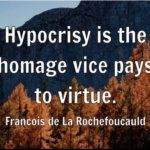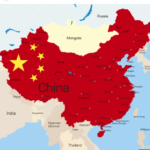Those who lived in a so-called communist country – i.e. a country, where Marxsism-Leninism was the state ideology – remember it very well: party leaders of all calibres when delivering speeches would constantly bring up a few topics and these were class struggle, bourgeois anti-values, capitalist enemies, sanctity of the working class, historical materialism, the inevitability of the victory of Marxist and Leninist ideas, and the like. All speeches contained these phrases and got across these messages. It was like a ritual: everybody expected that and nobody was surprised. It was like saying good day or goodbye, it operated like a reflex, like responding with a not-at-all or my-pleasure upon hearing a thank-you.
Much the same we can observe nowadays when we listen to the speeches delivered by Western politicians. Surely, the set of words and phrases is different, but the ritual of repeating them now and again, here and there, without rhyme or reason is precisely the same. The words and phrases that we have mentioned at the beginning of this text have given way to words and phrases like systemic racism, democracy, human rights, right to choose, transgenderism, tolerance and a few others. Be it Rishi Sunak or Macron, von der Leyen or Biden, we may sum up their speeches even without listening to them. In general: using these words and phrases they all opt for the greatest good and are opposed to evil; by the way, just as their Marxsist-Leninist predecessors.
Still, President Biden’s speech recently made at Howard (one of the HBCUs or Historically black colleges and universities) was a bit of a surprise. Not in that he said that climate change was a problem (the usual clap-trap), not in that he said that blacks are the future of the United States (but they are! they are! – who else?), not in that he said that women have the right to choose (but of course!), but in that the most serious threat to the United States of America is – make a guess! – white supremacy! Literally, the president of the United States called on people to stand up against the poison of white supremacy which is the most dangerous terrorist threat to our homeland. You see? It is not China, after all, not even Russia, nor the hundreds of thousands of immigrants crossing the southern border, nor recession, nor the impending de-dollarization of world economy, nor the ever-present shootouts in American cities but white supremacy.

America’s future
Where can he see it? In American government? In American movies? In American advertisements? In American mass media? In American whites taking the knee before their black co-citizens? In American affirmative action? In American de-segregated schools? In the rules of the American Academy of Motion Picture Arts and Sciences?
President Biden said, racism has long torn us apart. It’s a battle that’s never really over, which reminds one of the sentence Comrade Stalin said many, many years after the Bolshevik Revolution had been completed that resistance to socialism increases as its successes mount. You see? You develop socialism and the bourgeois element is becoming stronger and stronger; similarly, you build a raceless society and all of a sudden racism (only white racism is understood, no other) is gaining momentum!
But then American elites are known for such discrepant statements: do you remember the pandemics of the unvaccinated, repeated by TV anchors ad nauseam? Due to the overwhelming propaganda Americans mostly subjected themselves to the global medical experiment and despite that fact the number of those who did not want to take part in the national stampede… grew! That’s at least the understanding of the word pandemics: the number of the infected – in this case infected with the stubborn disobedience not to be vaccinated – kept rising. How could the number of unvaccinated spread if more and more people were getting the jab?
Biden’s ghost-writer should really have resorted to this term: America is threatened by the pandemics of white supremacy or supremacists! Or he should have copycatted Comrade Stalin and formulated something like: resistance to raceless society increases as its successes mount.

















